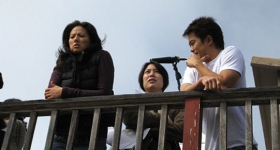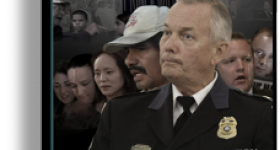THE CONCEPT SEEMED simple enough: make film about the suffering, neglect and mistreatment of AIDS orphans in China, show film and encourage change. The catch: screen film on Chinese national television. Key terms: censorship, Communist government, bureaucracy, conservative culture and lack of funding. The surprise: win Academy Award.
Filmmaker Ruby Yang’s Oscar win earlier this year for the documentary Blood of Yingzhou District signifies yet another turning point in a long and arduous path of unknowns. For a while, it did not seem like the film about HIV-infected orphans whose parents had died of AIDS-related complications was going to be made at all. However, by the time the project was finally green lit, it had already transformed into a much larger endeavor: a full public service announcement campaign for the Chinese public titled China AIDS Media Project (CAMP). Perhaps the greatest unknown of all was the impact of Blood of Yingzhou District, which Yang calls, “the most satisfying experience of my life.”
Up to 100 million viewers have seen CAMP programs in a largely rural country where pre-marital sex is taboo and AIDS education is at a primitive stage. A recent UNICEF survey of 2,500 15 to 20 year olds in China found that half of them could not accurately name a single way to protect themselves from HIV. Half of the sampling also falsely believed that sharing chopsticks could transmit HIV. UNICEF estimates that 650,000 people in China live with HIV/AIDS, 70,000 people were infected in 2005 alone and AIDS has orphaned around 76,000 children.
Yang conceived the project in 2000, after reading reports of how China was devastated by AIDS. “Almost every day there were reports by the New York Times that these children were orphaned,” she said. The result was CAMP, the brainchild of Yang and Thomas F. Lennon, with whom Yang collaborated on a previous project, Becoming American: The Chinese Experience. It was Lennon who suggested screening the CAMP programs in China in order to achieve its intended impact.
Thus began an uphill battle for funding until 2003, when controversy around the official cover up of the SARS epidemic brought about a shift in national health policy. The funding came, and with the right introductions, so did the subjects for Blood of Yingzhou District, making it possible for Yang to direct the unprecedented documentary.
Besides Blood of Yingzhou District, Yang has directed other pieces for CAMP: a series titled “Children Affected by AIDS” in collaboration with UNICEF, advertisements featuring NBA stars Yao Ming and HIV-positive Magic Johnson shaking hands and another award-winning documentary. The ground-breaking 30-minute short, Julia’s Story (2005) is about a university student who contracts the virus from a former lover, which marks the first time a Chinese national talks publicly about being infected. Yang and her team also have their sights set on a series of Internet public service announcements targeting youth.
After spontaneously moving to Beijing from San Francisco in 2004 to open the China office of CAMP, Yang has been submerged in everything from run-of-the-mill housekeeping and office maintenance to “hush hush” negotiations about hefty issues like censorship.
“The first half year I had to get a staff together, a production schedule and train people to a US standard. That was tough. The first year, I had 20 people in and out of my office. It was like a training school!”
Today, Yang, who was born in Hong Kong, has precious little time to expound on the intricacies of backdoor negotiations with Communist Party officials. “Maybe I’ll write a book one day,” Yang coyly demurred. The last thing Yang needs is the Oscar limelight to upset the delicately negotiated status that enables her to continue working in China. “The publicity might not be good for the kind of work I do in China, but it can also open a lot of doors in terms of fundraising. People are bringing projects to us.” These days, Yang treads a fine line as a semi-covert, quasi-foreign, activist filmmaker in a country where censorship is the norm and being an activist and a foreigner can be a very dangerous combination.
Chinese media often refer to Yang by the Mandarin term lumei huaren: an ethnic Chinese person who has traveled to America. Critics have equated Blood of Yingzhou District to airing dirty laundry, even going as far as accusing Yang and her collaborators of exchanging China’s tears for awards. “Chinese people who have seen it really like it,” Yang said. “It’s the people who haven’t seen it [who say[ maybe the Oscar was given because [the film] is about AIDS, because it’s political.”
But much of Yang’s oeuvre, which spans more than two decades and reflects a strong penchant towards social justice and youth, has been political. Yang’s editing work includes a.k.a. don Bonus (1995) and Street Soldiers (1991), both about troubled youth in San Francisco, as well as All Power to the People (1996), about the Black Panther movement, and
Becoming American: The Chinese Experience (2003), arguably the most widely distributed documentary of Chinese American history.
Following her work in AIDS awareness, Yang has her sights set on tackling smoking in China, no small feat given that the estimated number of smokers in China, 350 million, is greater than the entire US population, and a significant faction of the national economy is dependent on the tobacco industry.
Perhaps Yang will focus on a humanitarian message, which has helped Blood of Yingzhou District bypass any censorship barriers. “We’re not doing a journalistic piece,” Yang said. “If we were, we would have talked more about why they sell blood.”
And things are changing: television stations welcome CAMP’s programming because it’s free and in vogue. “AIDS awareness is a very hot topic now,” Yang said. “It is becoming good to be an AIDS spokesperson.”









Comments